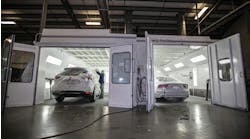Deep in the recesses of the American landscape there exists a being so rare that it may avoid detection from the untrained eye. Casual observers are often fooled by its outward appearance, but the truth is bound to fill onlookers with perplexity and awe.
This endangered species struggles daily for life under the hungry, baleful gaze of the most serious predators, yet the group survives and lives to share its exceptional story.
Of course, we’re referring to the independently owned distributor and its unique place in the automotive industry.
Much like a scientist searching for that rarest of insect hiding among the towering trees of the Amazon, our hunt for true independent aftermarket business owners was met with a curt “good luck” by many of our first contacts. Undaunted, we pressed on.
We eventually found a number of independent jobbers and WDs, each of whom have settled into a niche and crafted their own identity, building a loyal customer base despite corporate competition nearby. Among these, a significant percentage was unable to even take time from their daily uphill battle for profits to participate in an interview.
Some displayed a unique sense of humor and admirable optimism in the face of their struggle.
Consolidation has occurred rapidly among retailers, and for their part, distributors have been somewhat of a holdout in this consolidation game when compared to other business segments — at least for now.
Defining the independent
Even defining the independent distributor in today’s business climate is tricky. There are many family-owned operations that affiliate with a large program group to reap such benefits as price cuts and training opportunities, yet they maintain their stance as independents. Then there are those who belong to a smaller, non-exclusive buying group, which allows them the liberty to shop wherever they please.
Most unusual in the modern parts distribution system is the independent business that has no program group or buying group membership whatsoever. These companies admittedly face a clear disadvantage, especially when it comes to product purchasing.
The independent distributor is a relic of a simpler time when locally owned businesses were prosperous and a small company was a solid part of the American dream. Many owners came of age in post-WWII America and will either sell or close when the current generation of owners retires. These same companies would likely not survive were they to launch the very same businesses today.
Don’t be fooled by the banner
Quantifying the number of independent distributors out there is perhaps as easy as finding a greased needle in a haystack of wrenches.
“Nobody has data on independent jobbers,” says Douglas Washbish, president of Moog Louisville Warehouse.
While family owned, Moog Louisville would surely be considered a large-scale distributor, as it operates 16 locations throughout the metro Louisville area. Regardless, he still believes in the importance of independents in today’s marketplace.
“I think independents are successful,” says Washbish, who is also chairman of the membership committee for the Automotive Warehouse Distributors Association (AWDA), a component of the Automotive Aftermarket Industry Association (AAIA).
Some independent jobbers fly the Bumper to Bumper banner, he adds, but “I think there are some independent jobbers out there, some of them who don’t fly any banner at all.”
Cautions Washbish: “If you’re a WD and not in at least a bad buying group, you’re really getting taken advantage of.”
A majority of those we interviewed admit it’s only a matter of survival for independents to affiliate with buying groups, but it doesn’t mean that these companies have become “corporate.” Many still have their choice of whom they buy from and do business with, yet they get the price breaks, training and incentives of larger groups.
“Consolidation has occurred and is continuing to occur and there’s strength in numbers,” says Larry Northup, AAIA’s staff liaison for AWDA, which has 276 companies on its membership roster, half of whom are manufacturers. “More and more are getting involved in branding and working actively as a group.”
In order for independents to persevere, they need to be in unique markets where there’s not a lot of competition, and their service and standing in the community are paramount to success, he believes.
“It’s similar to many other businesses in that it sounds ironic, but it’s easier to compete when you don’t have competitors,” adds Northup.
When in doubt, make your own parts
Lyle Burgess’ inventory would seem counterproductive to any other wholesaler. The owner of Stockton, Calif.-based Rare Parts, Inc. claims to have a stock that totals in excess of 2 million chassis parts.
Rare Parts fulfills a distinct role for the market — offering hard-to-find parts, whether its suspension components for a 1939 Plymouth or pieces to a 1914 Packard.
These slow-moving parts would be an albatross around the neck of a larger scale distributor, but Burgess says he is a last resort for techs and other wholesalers who can’t find the parts anywhere else; these slow movers keep him in business.
“A lot of my calls come from people that have a problem, and we have to be able to fill that need,” says Burgess, who has operated Rare Parts for more than 20 years.
Initially running a wheel alignment service, Burgess often encountered problems getting the right suspension parts from major distributors. He started Rare Parts to remedy this and began buying up the slower moving inventory from other distributors, even going so far as to make parts in-house when demand exceeded stock.
Now, the company builds more than half the stock it sells, and with a complete testing facility, Rare Parts can actually improve upon the old OE parts it replaces.
Burgess believes this business model would not be suited to anyone but an independent like himself.
“If you looked at return on investment, I wouldn’t look good at all, because we stock so much to fill all the special needs,” he admits. “It looks bad on paper, but a lot of these parts we picked up at such drastically low prices; it offsets the price of stocking them.”
There really is no advantage to joining a buying group or finding a larger affiliation for Rare Parts, suggests Burgess.
“If we were part of a larger corporate culture it’d probably be the MBAs’ decision on what part to stock and not to stock,” he says. “I don’t think we could sell our concept if we were part of a large group.”
When asked why he remains independent, he at first answers with a terse, “Sometimes I wonder.”
But upon more reflection, Burgess claims that even if there were a couple other companies doing what he does, they would all go broke. And his customers do appreciate his role in the marketplace.
“I think traditional distribution groups do appreciate somebody that can furnish something unusual for them,” he adds.
He has been approached by prospective buyers in the past, but Burgess feels “by staying independent we can follow old rules we’ve established over the past 27 years.”
A true mom and pop shop
Tommy Crosswhite has one of the most manageable staffs in the aftermarket: himself and his wife. And he loves the fact that he has complete control over who he answers to and with whom he does business.
The owner of T J Enterprises, in Estancia, N.M., Crosswhite relishes his 13 years of independence, but doesn’t know how long he can remain profitable as larger stores move into town and chip away at his market share. For one thing, he doesn’t pull in the kind of bottom line that would be required of a larger corporation.
“I don’t know of anybody that would take this on. The first thing out of their mouth would be, ‘I need a 13,000-sq.-foot showroom,’ and our building’s not even 13,000 sq. feet. If I didn’t own the building I’m in, I would really be in trouble,” admits Crosswhite, who says he plans to remain independent — at least until he finds someone who “wants it worse than I do.”
His customers are loyal, based on a history that no corporate competitor could ever hope to gain in the area. For one thing, Crosswhite was a technician for 20 years before health problems forced him to retire and instead focus his efforts on selling parts. Additionally, “I know most of these people on a first-name basis. We went to school together, palled around.”
This community connection is also what Tom Baldwin feels helps him stand out against his competitors.
The owner of Baldwin Auto Parts, in Boiling Springs, N.C., sponsors a Little League team and helps out with the local Rotary and Lions clubs with door prizes for fund-raising events.
These same groups would be hard pressed to find donations and sponsorships from a larger corporate store, he says.
Richard Gerard Jr., owner of Piston, Ring & Machine Co., in Washington, N.C., hosts a big fish fry every year, in which he feeds hundreds of customers in an effort to give something back.
“If you give back every year, then it’s going to come back several times over,” says Gerard, whose company rebuilds engines and does machine work and general repair along with selling parts. “We’re not just a store: We try to service our customer, and we try to learn who they are, what they do.”
Many independent distributors find that diversifying their businesses into such fields as agriculture helps them stay afloat.
Piston, Ring & Machine survives by selling to the timber, farming and commercial fishing industries on top of its traditional accounts, says Gerard, who adds his company recently starting selling small tractors.
Crosswhite fulfills discrete regional needs as well, like selling parts to a local dairy and a 20-acre greenhouse, as well as selling to an area granite mine.
Program group lines are blurred
Though he belongs to Independent Auto Parts of America (IAPA — which makes up half of the Automotive Distribution Network), Tom Baldwin still considers his company staunchly independent. He can buy parts from wherever he likes, a convenience that Baldwin believes allows him to pursue better prices if he wishes.
He was a member of CARQUEST for seven years, but he parted ways with the group in 1983.
“I feel that being independent is the best for my business,” says Baldwin. However, “Buying from CARQUEST or NAPA is a little simpler if you’re buying from one warehouse. I’m buying from five or six different suppliers.”
Gerard, from Piston, Ring & Machine, says his is a Bumper to Bumper store, but the company belongs to the AIM buying group. He is able to buy products directly from the manufacturer if he wishes. “I don’t want to be just under one thumb,” says Gerard.
Still, his company is a family business in which he’s been involved since he was 14. In 1961, his father and his uncle started the operation.
“Had I not been involved in the business, more than likely my dad would have sold the business at some point,” admits Gerard, who will likely pass the torch on to his son, who’s actively working for the company.
He says he’d like to see Piston, Ring & Machine someday celebrate 100 years.
While customer loyalty is cited as an upside to running your own business, customer perception can be a distinct downside for independent distributors.
Baldwin battles customer perception of his competitors that is sometimes unrelated to how he operates.
For example, a customer recently priced a throttle body repair kit, which was approximately $9.95, and when this customer came to Baldwin’s to buy the part, he said a corporate competitor priced the same item for $29.95.
Rather than acknowledge that Baldwin had the better price, the customer instead thought the other store made a mistake in its pricing, as if the customer couldn’t believe the independent store had the better price.
“If it was me, he would have told everyone he knew,” laments Baldwin. “But because it was (a corporate competitor) he thought it was a mistake.”
Kevin Pierce, owner of Brake & Clutch Exchange, Inc., in Springfield, Ill., says the buying power, or lack thereof, is probably his biggest disadvantage as an independent. He’s had to cut employee health benefits to try to maintain an acceptable bottom line.
He does retain customer loyalty, but it’s not as strong as it was five years ago, which amazes Pierce. “You see a father that runs the place and the son takes over and the loyalty’s all gone.”
A slow but sure end?
The role of the independent distributor will not diminish anytime soon, but many of these business owners are well aware of the big picture and the inevitable consolidation trend that is attempting to gobble up every independent in its wake.
Gerard, from Piston, Ring & Machine, says, “You’ve got to outshine the man next to you. In order to be successful, you’ve got to be tenacious in what you do.
“I think that being your own boss every day is a great challenge,” he adds. “I want to succeed, I want to see our business succeed.”
Says Baldwin: “Some of the consolidation I see does bother me because I fear for what the future holds. The big ones are getting bigger and bigger, and the small ones like myself are getting fewer and fewer and that’s always scary. It’s a difficult business to operate as an independent.”



